With a consistent stance on ensuring human rights, up to now, Vietnam has had enough "resistance" against all distorted arguments of hostile forces, confidently participating in the global "rules of the game".
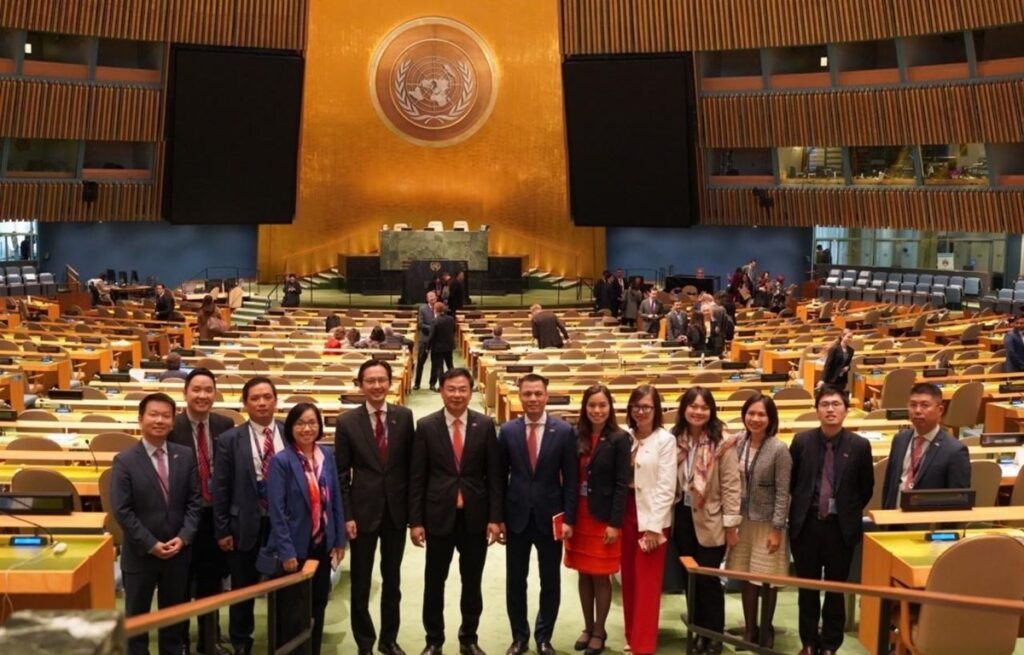
The Vietnamese delegation attended the voting session and announced the results of membership of the United Nations Human Rights Council at the United Nations Headquarters in New York, the United States. (Photo: VNA)
Lesson 5: Following international recommendations: Vietnam confidently participates in global "rules of the game"
After many years of efforts to “build to fight,” ensuring “soft power” in human rights, Vietnam now has enough “ resistance ” against all the distorted arguments of hostile forces; maintaining political security, social order and safety, not allowing “hot spots” of security and order to occur; thereby proactively participating in the global “rules of the game.”
With the above results, at the Human Rights Training Conference for more than thousands of grassroots officials, held recently in Lai Chau province, Deputy Director of the Department of External Information (Ministry of Information and Communications) Dinh Tien Dung affirmed: "The Party and State of Vietnam are always ready to exchange and have open dialogue with international agencies and organizations on human rights in a constructive spirit to enhance mutual understanding; so that international agencies and organizations can assess and evaluate the practical human rights situation in the country on the basis of fairness, transparency and objectivity."
Enough "resistance" against all distorted arguments
Emphasizing the consistent policy of the Vietnamese State to ensure equality, solidarity, mutual respect and progress among ethnic groups; ethnic minorities enjoy all legitimate human rights, Ms. Tran Chi Mai, Deputy Director of the Department of International Cooperation (Government Committee on Ethnic Minorities) said that recently, the trust of ethnic minorities in the leadership of the Party and State has been continuously consolidated and enhanced, reaching new depths and heights.
Along with that, social consensus has been raised, the great solidarity bloc of ethnic groups has been built more firmly, with enough "resistance" to all the distorted arguments of hostile forces; thereby contributing to maintaining political security and social order and safety. The movement of the entire people to protect national security has been developed extensively, without the occurrence of "hot spots" of security and order as in the past.
The survey of the Ethnic Committee also shows that the socio-economy in ethnic minority and mountainous areas has developed quite well in recent years.
Ethnic minority and mountainous areas have all achieved higher economic growth rates than before. The economic structure, labor structure and income have initially shifted towards increasing the proportion of industry and services, and decreasing the proportion of agriculture and forestry. Infrastructure in ethnic minority and mountainous areas has been invested in and built synchronously, creating conditions for people to access public services more conveniently. The potential advantages in each region and area have been exploited more effectively, contributing to increasing people's income.
In addition, education, vocational training, healthcare and health care for ethnic minorities continue to receive investment and development in both quantity and quality, contributing to improving the intellectual level and quality of human resources.
Attention has been paid to the work of preserving, conserving and promoting the unique cultural identity of ethnic minority communities; backward customs and practices have been gradually eliminated; a number of tangible and intangible cultural products have been restored and passed down. Every year, cultural festivals of ethnic groups are held, bearing the imprint of each region and each ethnic group, rich, diverse and unified in the Vietnamese national culture.
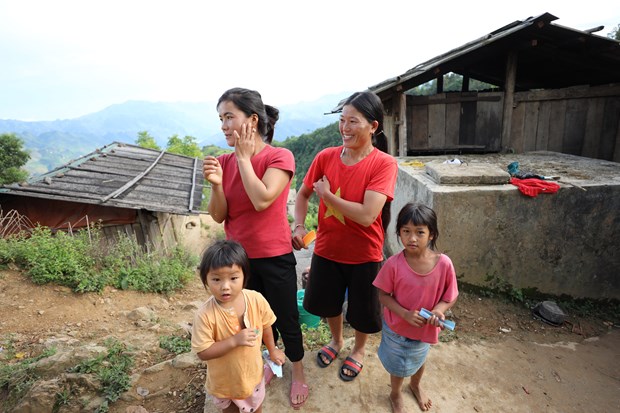
In Vietnam, according to statistics, the poverty rate according to the country's multidimensional poverty standard has decreased from 9.88% at the end of 2015 to below 3% in 2020. (Photo: Nhat Anh/Vietnam+)
Sharing the same view, Mr. Dinh Tien Dung, Deputy Director of the Department of External Information (Ministry of Information and Communications) also emphasized that in recent years, although Vietnam is a developing country with many difficulties in its socio-economic life, it has always made efforts and achieved positive results in protecting human rights.
Typically, according to the Socio-Economic Report at the 13th National Congress of the Party, the poverty rate according to the multidimensional poverty standard of the whole country has decreased from 9.88% at the end of 2015 to below 3% in 2020; the goal of universalizing preschool education for 5-year-old children has been achieved; there is no terrorism in Vietnam, people live and work in a secure, safe, and stable environment...
The United Nations World Happiness Report 2022 also confirmed that Vietnam's national happiness index ranked 77th (up 2 places compared to 2021).
“With the results achieved, the Party and State of Vietnam are always ready to exchange and have open dialogue with international agencies and organizations on human rights in a constructive spirit to enhance mutual understanding; so that international agencies and organizations can make assessments and assessments of the domestic human rights situation on the basis of fairness, transparency and objectivity. On the other hand, Vietnam never accepts and resolutely fights against subjective, one-sided, ill-intentioned, baseless arguments and assessments that do not accurately reflect the real situation,” Mr. Dung emphasized.
In that spirit, the representative of the Foreign Information Department said that currently, Vietnam is continuing to aim for the goal of increasingly better ensuring the basic rights of the people, building a socialist Vietnam with a rich people, strong country, democracy, equality and civilization. At the same time, it is proactively preventing plots and tricks to use the issue of "democracy and human rights" to sabotage the Vietnamese revolution.
Deep international integration, mastering information
To achieve the above goal, Deputy Director of the Department of External Information Dinh Tien Dung said that information and propaganda work plays a very important role and position. In particular, Directive No. 44-CT/TW dated July 20, 2010 of the Central Party Secretariat on human rights work in the new situation has set out the key tasks of human rights work, in which the first task is: Strengthening propaganda and education work for cadres, party members and people so that everyone has a deeper understanding of the Party's viewpoints, policies and laws of the State on human rights, rights and obligations of citizens, clearly recognizing the good nature of our regime for the people.
In recent times, in order to strengthen information activities and improve access to information for poor households, ethnic minorities, mountainous, remote, border and island areas, the Ministry of Information and Communications has advised the Prime Minister to promulgate and implement the Program for providing public telecommunications services until 2020; integrating policies to support information and propaganda for poor households, ethnic minorities, mountainous, remote, border and island areas in combination with the National Target Programs on information and the National Target Program on sustainable poverty reduction.
Along with that, the Ministry of Information and Communications has also advised the Prime Minister to issue Decision No. 942/QD-TTg approving the Strategy for e-Government Development towards Digital Government for the 2021-2025 period, with a vision to 2030, to universalize and personalize services (such as education services, health services) to each citizen to better serve people's rights; create opportunities for people in remote, border, and island areas to access online services in a fair, equal, humane, and widespread manner.
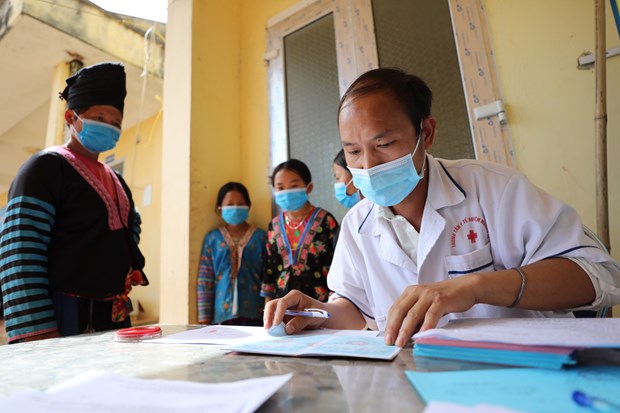
Taking good care of people's health and ensuring legitimate rights for ethnic minorities is the responsibility of the entire political system. (Photo: Nhat Anh/Vietnam+)
According to Ms. Tran Chi Mai, Deputy Director of the Department of International Cooperation (Government Committee for Ethnic Minorities), the great and historic achievements of the renovation process will continue to create momentum for the country's development as well as achieve the goal of "leaving no one behind." Vietnam's reputation and influence in the international arena will continue to increase, which will be the foundation for deeper and broader international integration.
Recently, the Washington Times on September 21 published an article supporting Vietnam's candidacy for the United Nations Human Rights Council for the 2023-2025 term. According to the article, Vietnam continues to be highly regarded at the United Nations for sending officials to participate in the UN peacekeeping missions in South Sudan and the Central African Republic, and for being an active member in negotiations to achieve the UN's priority sustainable development goals.
Agreeing with the above assessment, Associate Professor, Dr. Nguyen Thi Thanh Hai, Deputy Director of the Institute of Human Rights (Ho Chi Minh National Academy of Politics) said that in order to fulfill the legal obligations of a member state to the conventions, in recent years, Vietnam has proactively committed to and fulfilled its obligations by promoting the implementation of the Party and State's guidelines and policies in the field of human rights; implementing legislative, executive and judicial measures to ensure human rights; drafting and submitting periodic national reports on the implementation of the convention; cooperating internationally in the implementation of the convention; building national programs to properly implement international commitments.
In particular, in recent years, Vietnam has proactively developed plans to implement recommendations from a number of United Nations human rights monitoring agencies based on decisions by the Prime Minister. This is the main and most direct recommendation method that Vietnam is applying to recommendations from convention committees.
Vietnam proactively participates in global "rules of the game"
According to Associate Professor, Dr. Nguyen Thi Thanh Hai, Deputy Director of the Institute of Human Rights, Ho Chi Minh National Academy of Politics, the reason why the Party and State of Vietnam pay special attention to human rights issues is because this is a "new rule of the game" on a global scale. If Vietnam wants to integrate internationally, participate in economic, cultural and diplomatic integration, it must participate in this global "rule of the game".
“Just like when we play badminton or soccer, we have to understand the rules of the game. If we want to participate in the ‘global playground’, we have to interact and dialogue with the world; share Vietnam’s implementation of human rights with countries around the world,” said Ms. Hai.
Ms. Hai also affirmed that Vietnam currently does not consider human rights an internal issue. The evidence is Vietnam's very active participation in international human rights mechanisms. Vietnam's initiative has been demonstrated in many bilateral and multilateral dialogues at international forums.
However, it is important to note that human rights also have a political aspect. Although human rights are related to each individual and person in society, such as “the food we eat, the water we drink, the air we breathe every day are all related to human rights,” this is also a phrase that is easily exploited by reactionary forces and organizations, to make human rights a sensitive issue and become “distorted.”
Therefore, according to Ms. Hai, the awareness of each officer, especially the police force, plays a very important role in propagating and protecting the legitimate rights of the people.
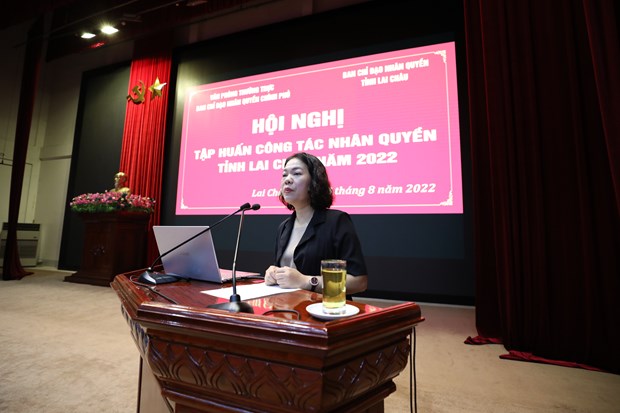
Associate Professor, Dr. Nguyen Thi Thanh Hai, Deputy Director of the Institute of Human Rights, Ho Chi Minh National Academy of Politics. (Photo: Nhat Anh/Vietnam+)
Another reason to say that human rights are a “new rule of the game” globally is because there is now a whole international legal system on this issue. Vietnam accepts to participate in this “game” by ratifying many international conventions and treaties on human rights; actively participating in forums and dialogues globally. Moreover, human rights are also an issue of international diplomacy. Therefore, in bilateral dialogues or in trade negotiations that Vietnam participates in, the content of human rights is also brought up for fair exchange and discussion.
“From a positive perspective, participating in the ‘new rules of the game’ on human rights as requested by the United Nations is also a very good channel for the Vietnamese government to proudly report to the world in a proper manner about its achievements. From there, we can attract more investors to Vietnam,” Ms. Hai emphasized.
Identifying the importance of human rights issues, the Deputy Director of the Institute of Human Rights said that in the past, although still poor, Vietnam still contributed 1 million USD each year to the activities of the United Nations; from 2022, Vietnam has doubled its contribution, to 2 million USD (about 46-47 billion VND). This shows that Vietnam's participation is becoming more and more proactive. Along with financial support, Vietnam has also participated in peacekeeping forces, actively contributing to the United Nations.
In the process of “consolidating” human rights and ensuring human rights, Vietnam has been a non-permanent member for two terms, 2008-2009 and 2020-2021; and a member of the Human Rights Council (the most important and specialized body of the United Nations on human rights issues) for the term 2014-2016. And now, Vietnam is campaigning to be elected as a member of the United Nations Human Rights Council for the term 2023-2025.
“In addition, our State is also adjusting a number of laws based on the recommendations of the United Nations Human Rights Council, such as the need for courts to be independent to ensure fair trials - this is a very positive issue. In fact, our State is also urgently developing a strategy to promote the rule of law; in which human rights are considered a core, consistent issue,” Ms. Hai informed.
In particular, according to Ms. Hai, Vietnam is doing a very good job in educating and training, raising awareness of human rights for the State's cadres and civil servants, especially police officers and law enforcement officers. Currently, the Ho Chi Minh National Academy of Politics - the training agency for leaders and managers from the central to local levels - also has a subject on human rights.
Along with that, a Government project is also being implemented, which is to include human rights content in the curriculum of the national education system; reviewing from preschool to university.
“In addition, regarding recommendations on hunger eradication and poverty reduction, I think Vietnam has been doing very well. As far as I know, some African countries have come to Vietnam to learn from its experience. This is proof that Vietnam has done very well in ensuring human rights and confidently participating in the global ‘rules of the game’,” Ms. Hai said./.
Vietnam elected to the United Nations Human Rights Council for the second time Recently, on October 11, 2022, at the United Nations Headquarters (New York, USA), Vietnam was elected to become a member of the United Nations Human Rights Council for the 2023-2025 term. Accordingly, 14 new members of the Human Rights Council will assume the responsibility for a 3-year term, starting in January 2023. The above results demonstrate Vietnam’s active participation in the activities of the United Nations Human Rights Council over the past years. On that basis, Vietnam’s strong commitments and efforts to promote and protect human rights have been recognized, trusted and highly appreciated by the international community. |
[Lesson 3: Establishing a “red thread” of unified human rights awareness to the grassroots level]
[Lesson 4: Strengthening trust, maintaining the "stronghold" and protecting border peace]




![[Photo] Prime Minister Pham Minh Chinh chairs a special Government meeting on the arrangement of administrative units at all levels.](https://vphoto.vietnam.vn/thumb/1200x675/vietnam/resource/IMAGE/2025/5/9/6a22e6a997424870abfb39817bb9bb6c)
![[Photo] Magical moment of double five-colored clouds on Ba Den mountain on the day of the Buddha's relic procession](https://vphoto.vietnam.vn/thumb/1200x675/vietnam/resource/IMAGE/2025/5/9/7a710556965c413397f9e38ac9708d2f)
![[Photo] General Secretary To Lam and international leaders attend the parade celebrating the 80th anniversary of the victory over fascism in Russia](https://vphoto.vietnam.vn/thumb/1200x675/vietnam/resource/IMAGE/2025/5/9/4ec77ed7629a45c79d6e8aa952f20dd3)
![[Photo] Russian military power on display at parade celebrating 80 years of victory over fascism](https://vphoto.vietnam.vn/thumb/1200x675/vietnam/resource/IMAGE/2025/5/9/ce054c3a71b74b1da3be310973aebcfd)
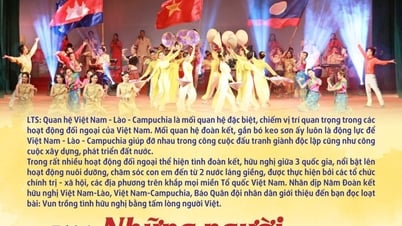
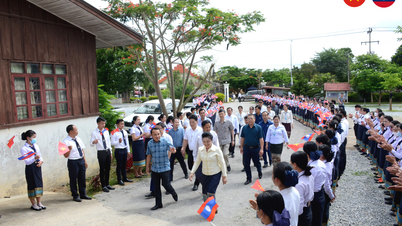
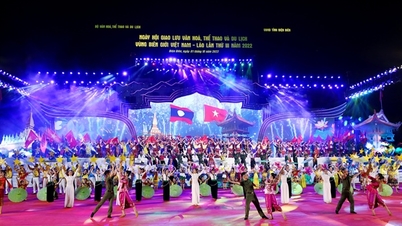
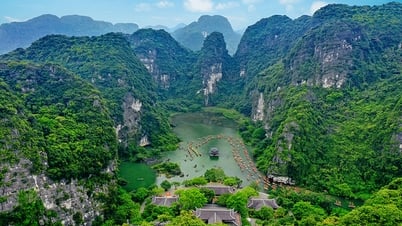
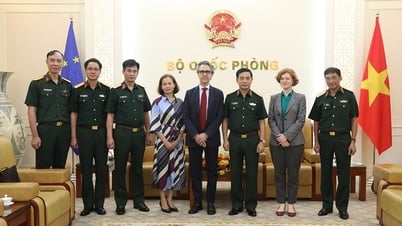
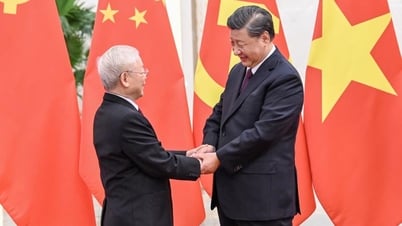






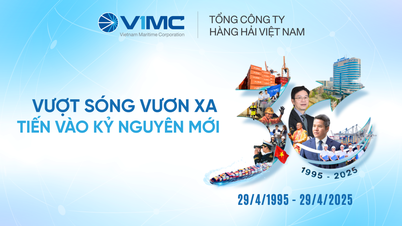
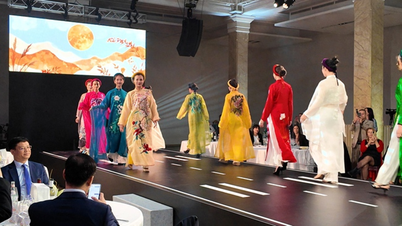




































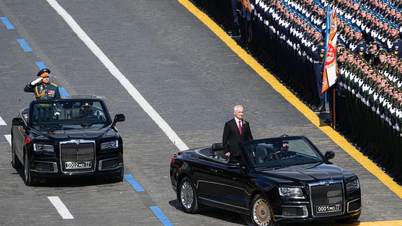

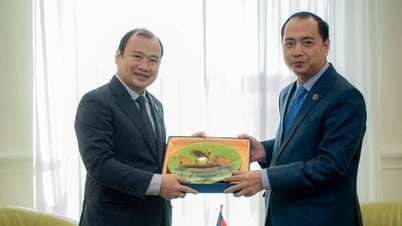

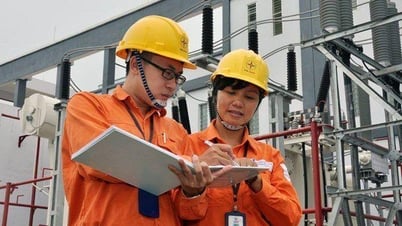

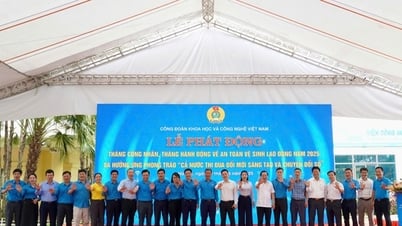

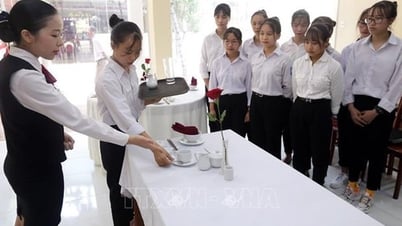
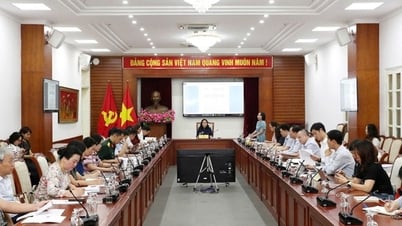



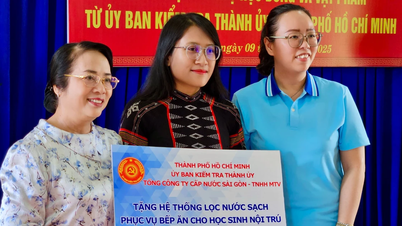

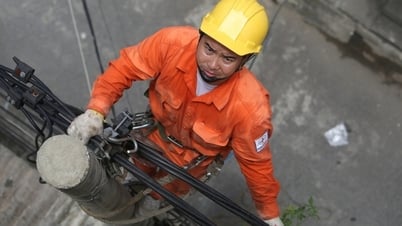
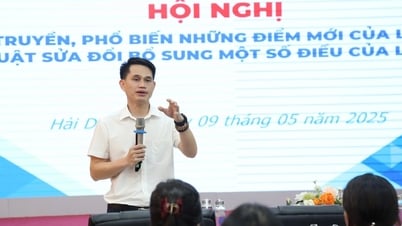

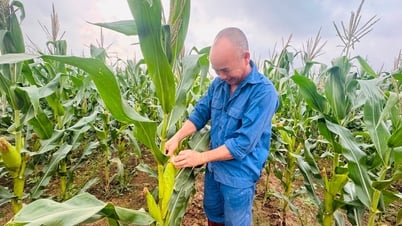
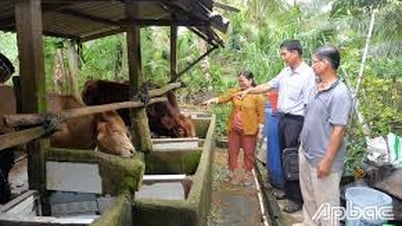











Comment (0)